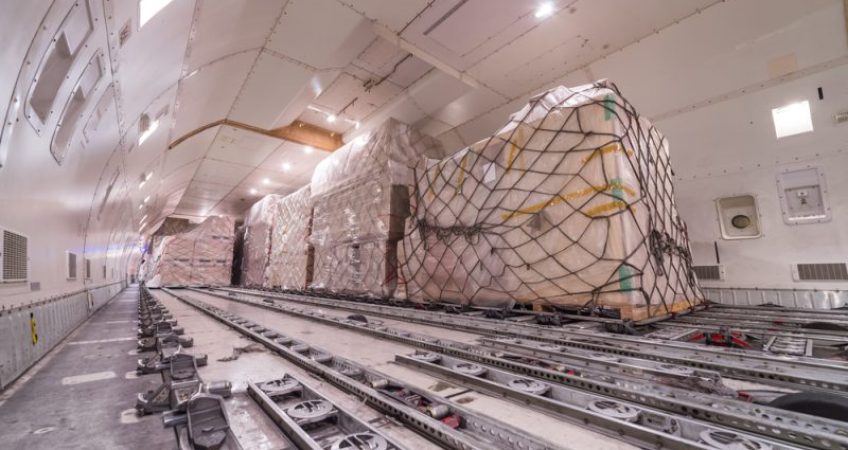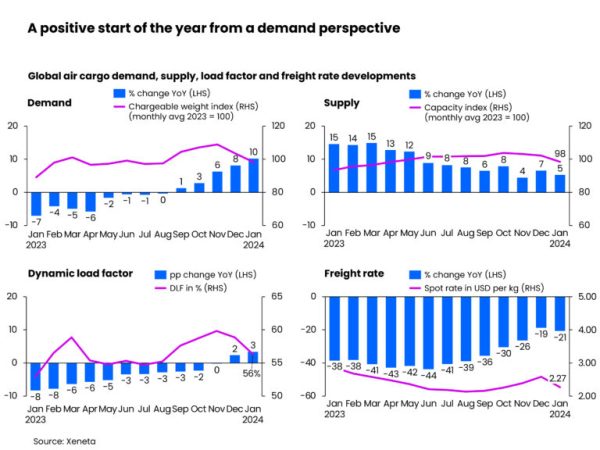
Air cargo volumes rose 10% year on year in January, but this hasn’t resulted in higher rates due to the availability of capacity.
Shippers’ concerns about Red Sea – Suez Canal supply chain delays, plus an early Lunar New Year, have pushed up air cargo volumes, although spot rates have declined, according to the latest market analysis by Xeneta.
“With plenty of available air cargo capacity in what is traditionally a quieter month for demand, however, fuller cargo holds are yet to translate into higher rates,” said the ocean and airfreight rate analytics platform.
“Globally, general air cargo spot rates in January declined -12% month-on-month to an average $2.27 per kg, consistent with the trend of the global dynamic load factor, which dropped three percentage points to 56% versus December.”

Xeneta added: “Compared to the previous year, January’s global average spot rate continued to show a double-digit year-over-year decline of -21%, although at a slower pace compared to the -38% decline seen in January 2023.”
Some of January’s higher air cargo volumes are likely due to some shippers, especially in the apparel industry and producers of manufacturing components, shifting from ocean transport to air due to the need to move goods ahead of the Lunar New Year, said Xeneta.
The platform observed ‘extraordinary’ surges in air cargo volumes from China and Vietnam to Europe for three consecutive weeks in January, surpassing even their peak season highs.
And it wasn’t all bad for rates, although there were mixed results on different trade lanes.
General cargo spot rates from Northeast Asia to Europe rebounded by 11% to $3.42 per kg in the week ending 28 January, after reaching their lowest point in the first week of January.
This contrasts with the trend of freight rates from Northeast Asia to the US, where general cargo spot rates continued their downward trend since mid-December, reaching $3.28 per kg in the week ending 28 January, down -7% compared to three weeks prior.
This suggests that the demand growth on the Northeast Asia to Europe corridor is more of a spillover from ocean transport rather than actual growth in consumer spending, said Xeneta.
While it may have boosted demand for capacity, the Lunar New Year did not manage to push general cargo spot rates from China to the US higher. These hovered around $3.43 per kg in January.

In comparison, general cargo spot rates from Europe to the US remained relatively stable in January at $1.77 per kg, with a slight increase of 4% from three weeks ago. This increase was primarily due to the reduction in cargo capacity, rather than a surge in demand, said Xeneta.
Niall van de Wouw, Xeneta’s chief airfreight officer, predicted that the Red Sea disruption will not result in a longer term shift to airfreight as shippers will eventually adjust to the situation.
“The situation in the Red Sea has brought nervousness to many supply chains and possibly encouraged some shippers to have a knee-jerk reaction, shifting to airfreight, bringing volumes forward, and securing capacity. However, the consensus seems to be that this will not produce a long-term positive effect on airfreight.
“Once the initial nerves and uncertainty subsides, stability will return once shippers simply accept that ocean freight may just take two weeks longer, causing the need for airfreight to then dwindle. I’m not hearing it is turning the airfreight market upside down like we saw, for example, during the ports strike on the US west coast.”
The industry may also be concerned with how the e-commerce market will perform post-Christmas peak season, while the “shrinking German economy, the slowdown of China’s economic growth, and the still-elevated interest rates due to high inflation could also mute global air cargo demand at least in the first half of 2024″, said van de Wouw.
“The market remains extremely difficult to predict. Let’s wait and see what happens in February when we might see air and ocean volumes as well as rates fall back if more stability returns to the market. But January was a strong slow month and, after a difficult year, the air cargo industry will not be complaining about starting the year on a positive note.”
aircargonews.net
>> Other news:
>> 4 main types of services of Advantage Logistics:
>> Our contact:
-
-
- Address: 3rd Fl., 55 Nguyen Van Giai Str., Dist 1, HCMC, Vietnam.
- Email: nicky@advantage.vn / truc@advantage.vn
- Hotline (cell/ zalo/ viber): 0909.054.866 (Mr.Quyền) / 0938.444.043 (Mr.Trực)
- Web: https://advantage.vn
-
